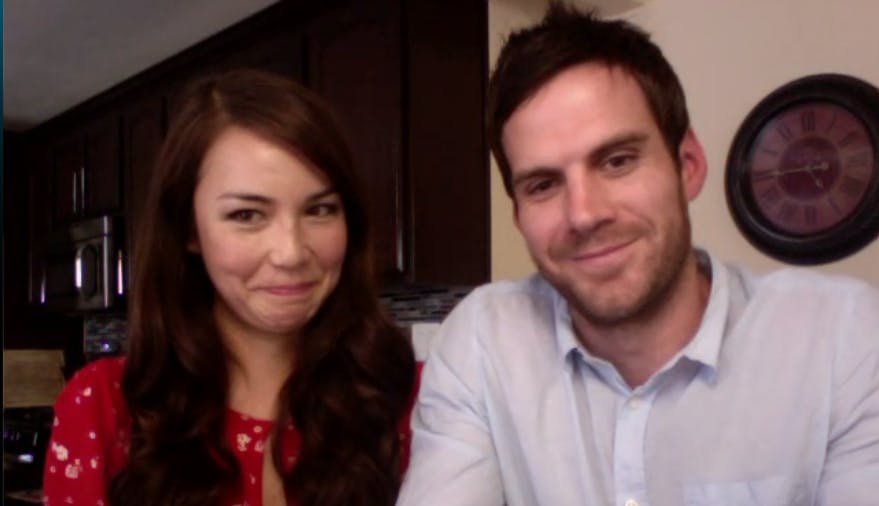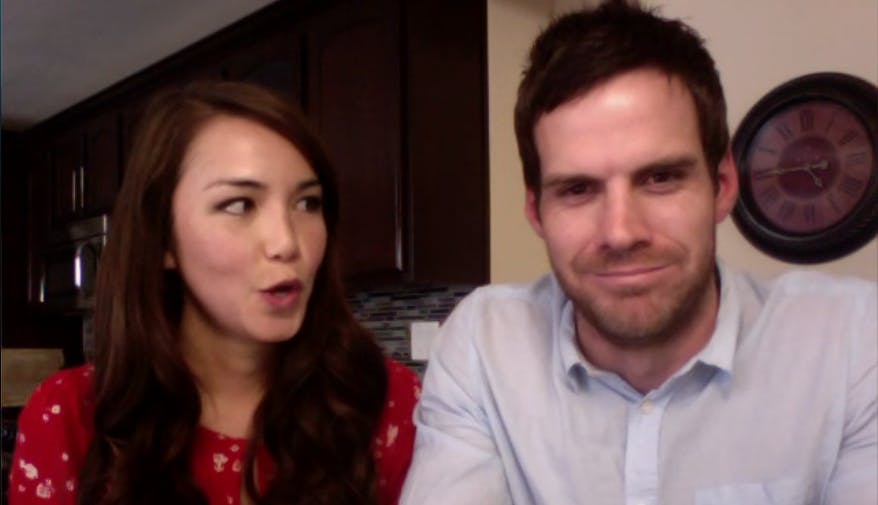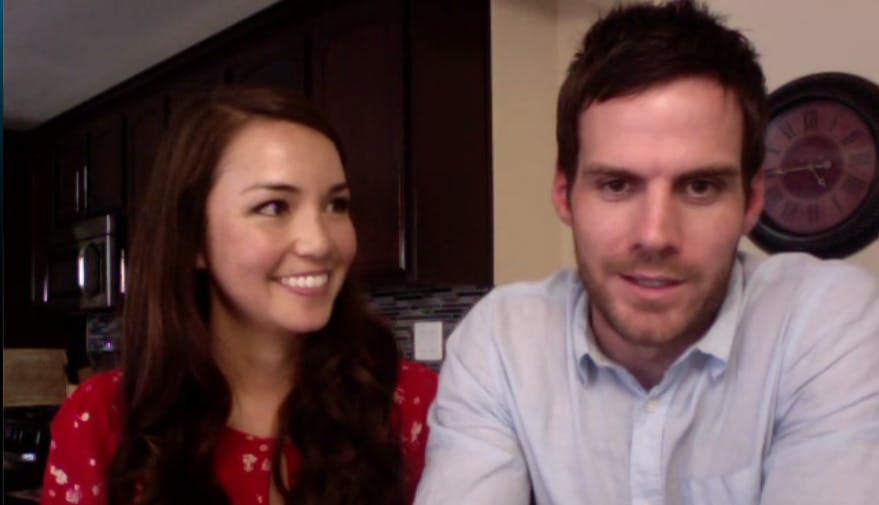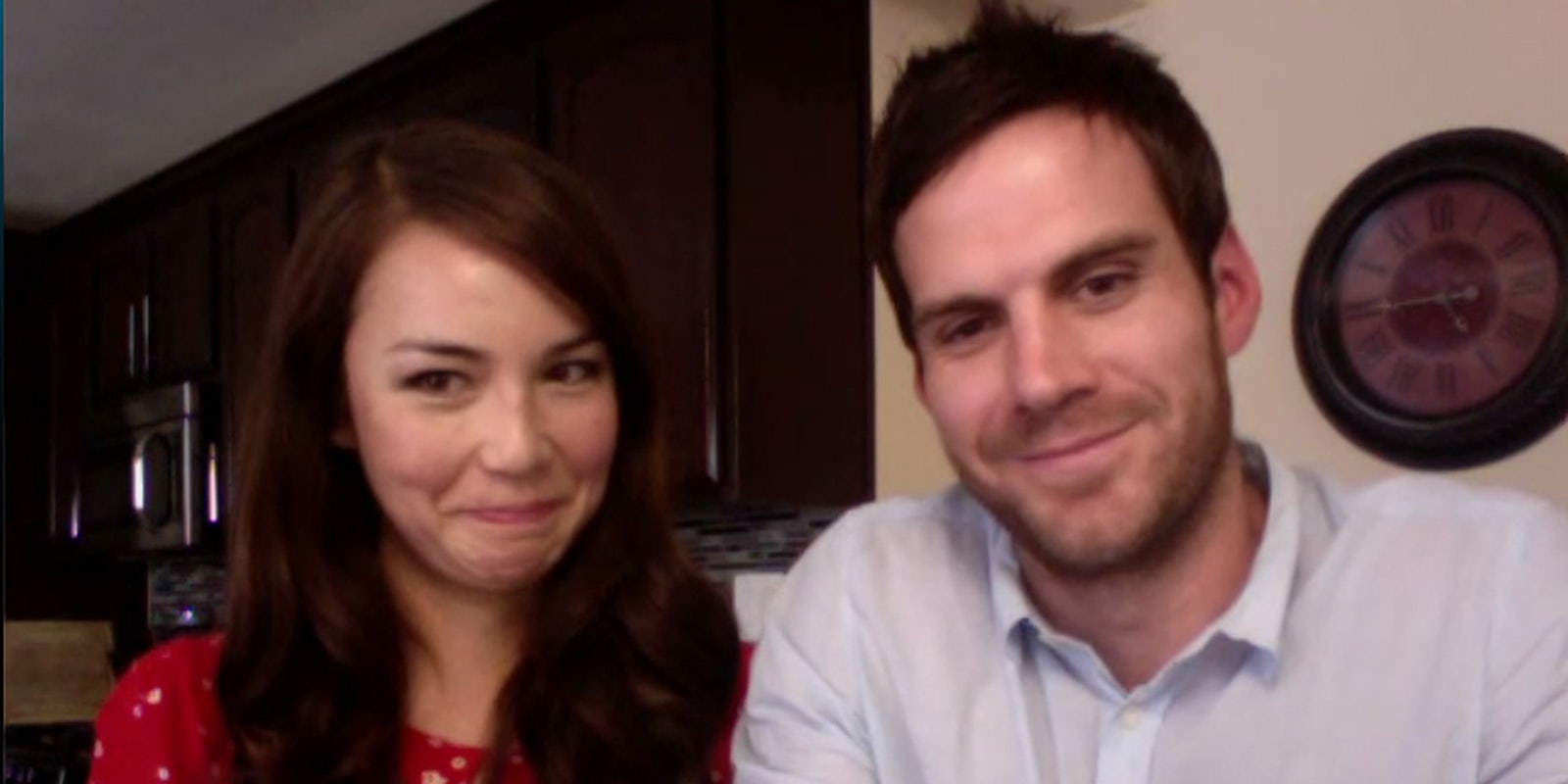Brent Bailey is annoyed. “I’d love to get away with that kind of thing,” he says, speaking of actor Stephen Chang, who plays Frank Churchill, the rival to Bailey’s Mr. Knightley, on the popular webseries Emma Approved. Chang playfully chewed the scenery in a recent entrance on set.
“I wish I could do that kind of physical comedy,” Bailey laughs, “But if I tried it, it’d just look ridiculous.”
Do we detect a little jealousy, Mr. Knightley? It’s one of many moments during a recent sit-down with the leads of the hit Jane Austen reboot in which cast members Bailey and Joanna Sotomura seemed to be fully inhabiting their roles as Alex Knightley and Emma Woodhouse.
It’s hard to believe that Sotomura, who confidently faces the camera twice weekly for the series’ avid viewers, is the same actress who declares that she was “nervous and shy” for her initial audition. Although she says that she started out feeling as if she had nothing in common with her character, the 27-year-old actress, whose career has included everything from performing Shakespearean comedy in Honolulu to being dismembered in the woods in Arkansas, is nothing if not adaptable.
“It’s definitely different!” she says of her role as the confident young life coach who discovers over the course of the series that she’s the last person to be dishing out advice.
“I think it was a couple of episodes in when we actually were filming, and we really let ourselves play with each other that we realized, oh… these characters were kind of meant for us.”

Emma Approved is one of the major YouTube webseries launched from the fictional digital media enterprise turned real enterprise, Pemberley Digital. Creators Hank Green and Bernie Su launched Emma as a much-anticipated follow-up to the highly popular Lizzie Bennet Diaries, itself a reboot of Austen’s Pride and Prejudice, set in the same modern-day universe as Emma.
Although much of the action has been on the series’ YouTube channel, Emma has also had a strong transmedia and social media component like its predecessors Lizzie Bennet and Welcome to Sanditon. With Lizzie Bennet’s Emmy-winning transmedia team at the reins once again, the world of Emma Approved has expanded to Twitter, Tumblr, Instagram, Google+, and Pinterest. They’ve launched a real-life charity drive to tie in to the fictional world of the show. They’ve even taken their act on the road to VidCon; they’ll hit Leaky Con later this summer.
Though the world of the three Austen tales has expanded, the cast of Emma has stayed tight-knit. As the series heads steadily toward its final quarter, all eyes are on the future and each other. “We’ve been together so long as a group,” Bailey notes.
Ten or 11 months we’ve been together, and we don’t know what’s happening after the book, if it’s going to continue further or what. So there’s that aspect where it could be coming to an end, and there’s that aspect of it where as you’re saying the lines on set it’s crossing over into reality.
But don’t think that sentiment has let them skimp on the hard truths Emma offers its protagonist, the confident 20-something who thinks she knows her own mind. Through the course of Austen’s Emma, she learns that things aren’t always what they seem, and that vanity mixed with too much self-assurance isn’t always the best route to wisdom. So far, the path of Emma Approved has followed a very faithful trajectory to the plot of Emma, despite the very different trappings. The small British village of Highbury has been replaced with suburban California, and Emma’s domain is now the all-too-fitting life coach business she runs with the help of lifelong friend Alex Knightley. Now, as the plot gets ever-more tricky, they’re playing it strictly by the book.
“We didn’t pull any punches,” Sotomura says when I ask about the climactic scenes in store for Emma. “This last round we shot’s going to get intense,” Bailey says. “Be prepared. There were tissues on set. It’s a hard story to tell. There’s hard lessons to be learned.”
Unlike her predecessor Lizzie, Emma isn’t always an easy character, but Sotomura says she’s been blown away by “how loving and supportive the fans are.”
“It’s been such an incredible year for both of us,” she says.
We talked to the two about their first meetings on set, the challenges of following up an Emmy-winning hit, and the fascinating paths their characters are taking to discover exactly how much they don’t know about themselves.

On auditioning:
Sotomura: I went in and they didn’t say what I was auditioning for. I think the character was disguised as like Millie Tollhouse, and I was like, “What the heck is this? But all right.” And I had a lot of fun. And then, “by the way, it’s Emma Woodhouse and you’re auditioning for the lead.”
And I got super-nervous and scared because I didn’t feel like I had anything in common with her, and I was like, how do I do this? So I just channeled whatever confidence I had stored deep-down, and I ended up booking it, thankfully.
Bailey: I think I was auditioning at the same time you were, but then I had like a really long break. I think they were casting Emma and then going back—I think they went through a first round of Alex.
Sotomura: And then I read for Knightley’s [audition], Annie’s, and Harriet’s, and I read opposite them for chemistry reads all in the same day. So I’d never done a chemistry [read] before, and he was the first one to walk in, of all the Knightleys, and I was just like, “Hi, OK, so what are you reading?” and just like stumbled everything and made a fool out of myself and was all embarrassed and bright red, and he was all professional and very Knightley. So, needless to say it was a fun day.
Was there a moment during the audition when you each just knew that you were reading with someone who was perfect for the part?
Sotomura: Well, I didn’t even feel like I was Emma… because like I said, I was nervous and shy and of course he walks in and he shakes my hand and I was like “blaaaghh.”
Bailey: Well, ‘cause I wasn’t sure, because when I auditioned for The Lizzie Bennet Diaries I would just read with whoever was the reader there. One time it was Mary Kate [Wiles], one time it was Ashley [Clements], so I had no idea if she actually was Emma or if she was just in the Pemberley family.
Sotomura: The true reason why is because I screwed up a lot and he made me all nervous. But I feel like he was Knightley during the chemistry reads, when we had a fun banter going on… but I think it was a couple episodes in when we actually were filming and we really let ourselves play with each other that we realized, oh… these characters were kind of meant for us.
On Mr. Knightley and drama:
Much is made of how Emma is “clueless,” but I think it’s equally important to note that Knightley is oblivious as well throughout most of the book. I think in Emma Approved, we see him content to sit in his office and ignore the drama swirling around him.
Bailey: I think he’s just the kind of the type of person who just doesn’t care about [drama]. He doesn’t care about what Frank is really up to, if he got a present for [Jane] or didn’t. I don’t think at the end of the day he cares—he’s just glad she got a new laptop so she can work faster.
He just wants to make sure on the general level that everybody’s taken care of and happy. If there’s a problem, he will address it. But I think beyond that, I don’t really see him going home and talking about the gossip of the day; I see him going home and still balancing worksheets or toying with Excel. I don’t think he’s that type of guy.
I think he does a really good job—or maybe it’s not a really good job—at masking his feelings and staying even-keel and focused on one thing at a time so that he’s not overwhelmed with life. It’s toward the end of the book that he actually lets his guard down for a second and then realizes his feelings for Emma, and then comes back and tells her.
I think that’s really the first time where he actually lets his emotional guard down and steps out of work mode for a second, and he’s almost so selfless that he doesn’t ever look out for himself. He’s always trying to make everyone else happy, so there’s no reason for him to ever have the time to gossip. Because he’s always happy, unless somebody else is unhappy, and then it’s not that he’s now unhappy, he’s just not happy that you’re [un]happy so he’s going to try to figure out how he can change things.
In the original story, Knightley is landed gentry and a squire who oversees a number of tenants. I was wondering how that translated into the current series for you.
Bailey: I could see Knightley owning properties and still having an entire side-business that’s completely separate from this, but he just has other people who are delegated out to run those tasks. I don’t doubt that Knightley has multiple avenues of different revenue streams and people who work for him. I mean Knightley in the original book and some of the adaptations I’ve seen has seemed much more reserved and with a straight posture and very business man and very—I don’t want to say boring, but he’s just very…
Sotomura: Composed?
Bailey: Yeah, I think my version and then Paul Rudd’s version [from Clueless] is a much more playful, mellow version of Knightley, whereas the book and then the earlier adaptations is definitely more conservative Knightley, which I think makes him more relatable for our series because modern-day audiences relate more with the fun, everyday guy. Almost the way that Daniel [Gordh] played Darcy [in The Lizzie Bennet Diaries] is how I see how Knightley would have been. I love the way that Daniel did that, but for someone who’s on camera all the time with Emma, I don’t know if that would have translated as well for our show, to not have the kind of, like, fun with bantering.
Sotomura: I think Knightley in our show needs to have a little bit of give with Emma’s push.
Bailey: Right.
Sotomura: I feel like if he were exactly like the book he’d have been a wall that she’s constantly hitting. He needs to have a little bit of sway.
Bailey: Instead of bantering I could picture him just literally staring at her and then leaving the room!
On fans who aren’t familiar with the story of Emma:
What has their reaction been like so far?
Sotomura: Well, I know at the beginning I think they were kind of shocked, because, you know, you had this super-relatable character of Lizzie Bennet, who you love instantly because you’re like, “Oh, I absolutely have been that girl.” And then you have Emma, and you’re like, woah, because she’s so confident and vain and a little bit on her own high horse. So I know in the beginning, it was hard for them, especially if they hadn’t read the books, to understand where we were going with this character and what her evolution was going to be.
But recently, from what I’ve seen, they seem to be really on-board and support the show and like her growth, especially after we had the scene with Emma and Elton, where she really gets put in her place and she gets fired from her first job, and has failed essentially for the first time. I think that was really nice for a lot of new fans to see that, oh, wait a minute, this isn’t a robot, this is a human person who is trying, and failing, and picking herself back up. They’ve been really supportive from what I’ve seen.
Bailey: It’s interesting to see fans who haven’t read the books—as the series has progressed, they’ve definitely caught on. It’s funny, because you can see from their comments that they pretty much know what’s about to happen, even without having read the books. Like when that whole laptop thing came, I saw so many comments from people who read the book, and they were like, they knew exactly who it was from. They were just like, “No, it’s obvious, I can see it.” I think the story is being told so well that even if you haven’t read it, you can kind of see what’s coming.
And it’s kind of 50/50 on both sides. You get some people who’ve read the books who absolutely love the way we’re adapting it, and then you get some people who aren’t as thrilled. But I think it’s definitely more positive than negative, which has been wonderful.
Has the success of Lizzie Bennet given you guys the ability to take more risks?
Sotomura: I know that’s a big reason why Bernie Su set Emma up the way he did. It could have been just like Lizzie Bennet where it was more realistic. But Emma’s is more sitcom-y and procedural, definitely very colorful and stylistic. I think that’s the risk they took. They went, “We could do another Lizzie Bennet Diaries but with Emma, or we could try something different.”
Bailey: Bernie said he wanted to try something new and see if he could push the boundaries more, which is I think what he’s been doing, not only with the show, but also with the transmedia aspects of it. And then now getting into Emma having a real-life fundraiser that’s tying into the show. I think the biggest luxury we got from the Lizzie Bennet Diaries was having a giant fanbase that loved Jane Austen, which then was like, “Cool, we’re already on board.” And then we got to take those fans onto the next show for us. And we’ve also had them have people go back and watch their show, so I think it’s been very mutually beneficial.
On friends and frenemies
One thing I love is how much Harriet has grown. Is that something that Dayeanne Hutton brought to the role or is that something that has been scripted along the way?
Sotomura: I would definitely say both. I think the writers really wanted to see Harriet become her own character, not just Emma’s side project. That way it’s kind of a trifecta, with Emma, Knightley, and Harriet running [Emma’s business]. And then I think also Dayeanne has grown and evolved as her own person and her own actress, and just like me, as the series goes on, finding fun ways to play with the character you’ve been given. So I’d say it’s a nice combination of both.
And like it sounds silly, but a big part of Emma Approved is actually the wardrobe as well. I know Bernie wanted to have it so that you could actually purchase the different items that the girls wear. Our stylist Jessica Snyder had it so that Harriet’s wardrobe also grew with the characters, so now she’s evolved and become her own stylist, but in a very Harriet Smith kind of way.
Bailey: The writing, the styling, her hair and makeup, as well as her confidence that’s built throughout the series—the combination of all of them has had the most impact on the series in terms of visible growth. If you go back and watch the first episode she’s completely different than she is on the most recent one. I think it’s a perfect little combination of everybody’s hard work.
In the original version, we had Mrs. Elton harping on Jane all the time and really being the social pressure that Jane has to react to. Without that, now it’s Emma that’s basically become that social pressure, and I think a lot of that facet of Mrs. Elton’s character has been put on Emma and their dynamic. How do you think that’s affecting their relationship and how you play Emma?
Sotomura: It’s definitely true. It’s hard because you have to try to play that relationship where Emma’s putting that social pressure onto Jane, but also trying to find a genuine connection with her, which is two very polar opposite intentions. So it’s been difficult, but also fun to explore. It’s interesting, because you can tell Emma maintains that tiny bit of jealousy of Jane, because she sees Jane as that perfect model of a human without trying. And Emma’s like, “Well, I am, too, but just a little bit better!” So it’s definitely an interesting relationship.
Bailey: I think it makes it interesting, too, because it keeps the relationship slightly friendly, but then also extremely competitive, which it’s fun to watch that go back and forth.
Sotomura: Frenemies, would you say?
Bailey: Frenemies.
Sotomura: But only from Emma’s standpoint, because Jane I don’t think has any idea.
Bailey: Jane’s kind of like Knightley.
What, at this point in the series, are Alex’s thoughts on Frank Churchill?
Bailey: Blehhhhh. I think Alex just thinks Frank Churchill in one word, would be ridiculous. He does look up to him from a business sense, that Frank is smart with his investments, his money, and he respects him on a work level. But I think that the way he holds himself and the way he acts around Emma is so completely unprofessional.
Which I think is where some of his jealousy stems from, because in a way I think he kinds of envies him, that he can be so carefree. Because he’s just like, “No, you can’t act like that in a place of business!” So I think it’s like a healthy combination of jealousy mixed with respect.
Sotomura: Like Jane and Emma!
Bailey: It’s pretty similar to Jane and Emma. I think Knightley’s definitely more jealous of Frank. Just because he’s got way better style. His hair is beautiful. And he can just get away with anything and everybody always laughs. I can see Knightley trying to do that thing where he pokes his head in, and everyone would just be like, “…You’re weird.”
There’s a healthy amount of jealousy there. But it’s good, because even for me personally, seeing how crazy Stephen will play Frank, it forces me to break out a little bit more to try to compete with that, and so I think that Knightley would do that from the same aspect: “All right, I’m going to be a little bit filthier, just so you still think I’m interesting, Emma.”
Sotomura: Aww.

You guys have said in the past that you’re looking forward to the romantic elements. Why do you think they’ve never considered each other romantically before now, or have they?
Bailey: I think they’ve been friends for so long they’ve just kind of formed that bond. Even if you had considered it, it wouldn’t be worth messing up the friendship, and now you have a business on top of it. I think Knightley’s logical mind is like, “All right, now we’ve got a friendship and a business, going into a relationship would just be an awful idea.” I think it really takes that moment—obviously the pivotal point in the book—to break them out of their routines and make them take a hard look at what they really want out of life and each other, which makes them eventually do what they do. I would say spoiler alert, but you know exactly what happens. So I think it’s one of those things where they’ve shut off that emotion completely towards each other. They still have that flirty, good chemistry, but it’s always like, well, she’s my best friend. So it’s when they decide to change from being best friends to embracing that they’re best friends and using that as a beneficial point of their relationship.
Sotomura: And I think, for Emma, too, she’s not used to losing things. She’s used to getting everything she wants and then keeping it and having it and just dictating a lot of aspects of her life. I think Knightley falls into that category. I think she’s so used to having him there, as a brother figure, as a friend, as a business partner, that she doesn’t realize how much she really cares about him until there’s a possibility that he could be gone.
Bailey: You don’t realize what you have ’til it’s gone.
Sotomura: I mean, it’s exactly that, but and especially for a girl like Emma, you don’t have to just realize it, you almost have to take it away in order for her to be like, “Wait a minute!” and then realize this entire time that it’s something she not only loves but desperately needs in her life. “It” being Knightley. So I think she just never considered the possibility of not having him there.
Bailey: I think that’s why Emma’s so good at being alone. It’s because she’s never actually alone. She’s always got those qualities you want in a relationship within Knightley. Which I think helps with her confidence, because then, she’s not even technically single. She has a business partner and such a strong relationship with Alex that it fills a lot of things that everybody wants to feel, having that closeness.
Do you think Alex has ever thought of that in that specific way? Why would I need to get married?
Bailey: He’s got kind of a great setup, but he’s got this perfect best friend there, and they have their own drama for their own reasons, but they don’t have relationship problems. They just have the really great parts of the friendship. So he’s like, “Why would we mess this up? If we’ve got something really great going, why would we complicate it?”
Sotomura: But after awhile you realize you need love in your life. I think they both kind of break eventually and realize that friendship can only go so far.
Bailey: I think you can only get so much fulfillment from a friendship and from a relationship you can get so much more. And I don’t think at the time Knightley or Emma really feels like they need that, and then when they lose each other, they realize they do.
Emma Approved updates twice a week on YouTube. Start watching here.
Screengrabs by Aja Romano


